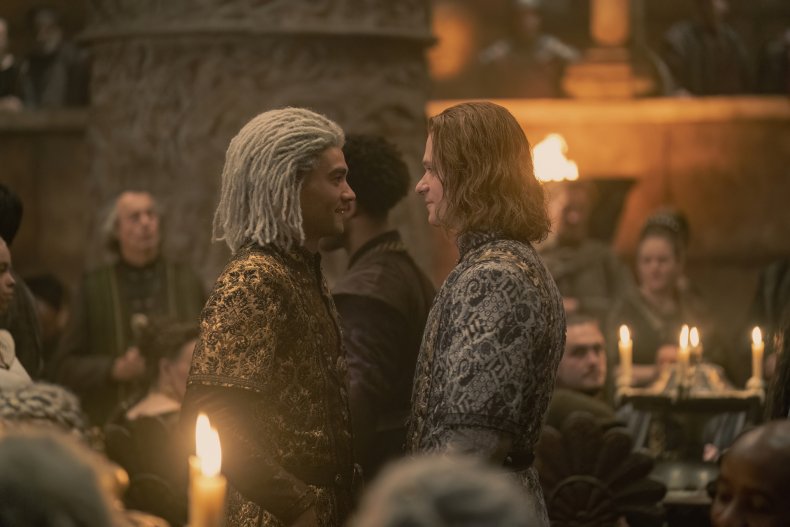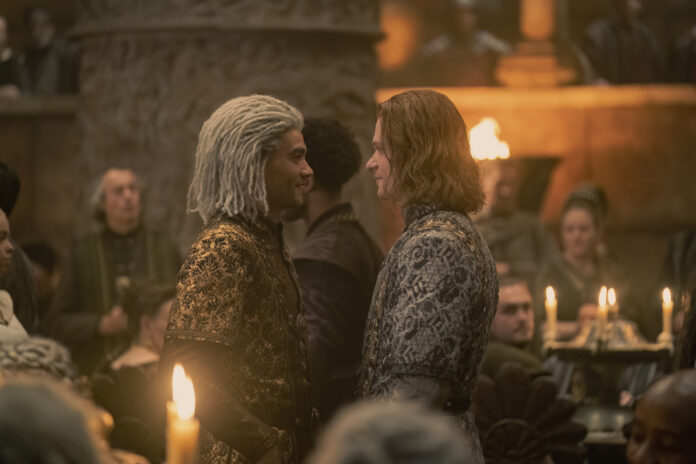Warning: this story contains spoilers for episode five of House of the Dragon.
Just one week after House of the Dragon fans celebrated Westeros’ first black — and gay — dragon rider, they are now calling the show out and accusing it of homophobic tropes.
In the most recent episode of the HBO series, viewers were introduced officially to Laenor Velaryon’s (Theo Nate) male partner, Joffrey Lonmouth (Solly McLeod) and witnessed the deep love the pair had for each other.
But by the end of the episode, Joffrey would be dead in one of the show’s most gruesome murder scenes yet.

Ollie Upton/HBO
The premise of the most recent episode saw King Viserys I (Paddy Considine) arrange a politically strategic marriage between his daughter and heir, Rhaenyra Targaryen (Milly Alcock) and Laenor.
Both youngsters are not so interested in marriage to each other because Laenor’s heart is with Joffrey and Rhaenyra has her own paramour, Ser Criston Cole (Fabien Frankel).
The pair come to an agreement that they will marry and have an open relationship where they keep their current lovers.
Criston, who also serves as Rhaenyra’s protector, seethes at the prospect of her marrying someone else and tries to encourage her to run away with him, but becomes enraged when she does not agree.
Later, at the welcoming dinner for Rhaenyra and Laenor’s wedding festival, Joffrey works out that Criston is the princess’ lover.
He approaches him with a proposal, saying they could work together to protect their loved ones during their marriage and that way ensure they would always be near them.
But a clearly upset Criston lashes out at Laenor and viciously attacks him in the middle of the reception beating his face to a bloody pulp.
It was this scene that lead to outrage amongst the show’s viewing public who accused House of the Dragon of relying on a trope known as ‘Bury Your Gays.’
The trope asserts that LGBTQ characters are killed off in TV and film at a much higher rate than other characters because they are seen as more expendable.
Critics also argue the trope is problematic because often these characters are the only positive LGBTQ representation in the TV show or movie.
“Anyway, House of The Dragon is homophobic and I’d give a MAJOR trigger warning for homophobia-induced MURDER for the latest episode,” wrote one fan on Twitter.
Another added: “Wow, so House of the Dragon really went for the one-two homophobia/misogyny punch this week. I don’t know why I’m even surprised anymore.”
And a third commented: “[tw: homophobia] that has to be a record for introducing the gayness of a character the same episode you have him brutally murdered thanks house of the dragon!!”
House of the Dragon and its predecessor Game of Thrones (GOT) are no strangers to controversy when it comes to their treatment of LGBTQ+, people of color and poor characters.
Often they face torture, incest, rape and violence at unparalleled levels compared to other characters.
Many of GOT’s openly gay characters were not only killed but faced gruesome deaths in the process, such as Renly Baratheon (Gethin Anthony) and Pedro Pascal’s perennially beloved, Oberyn Martell.
“It is problematic and harmful. And for those who will try to paint the homophobia as some sort of ‘historical accuracy,’ House of the Dragon is a fictional show set in a world with dragons and ice zombies,” said Los Angeles Times TV reporter Tracy Brown.
Criston’s murderous rage was also made worse by the fact he reacted impulsively, reminiscent of an act of “gay panic.“
The “gay panic” defense was often used to justify acts of violence against LGBT people, especially after perceived sexual advances.
“Criston’s panic and rage are textually tied to his guilt and anxiety over breaking his oath as a member of the Kingsguard and his worry that this secret would be revealed,” Brown wrote.
“But the sequence still amounts to a man, after being approached by a gay man who knows his secret, beating the gay man to death.”








